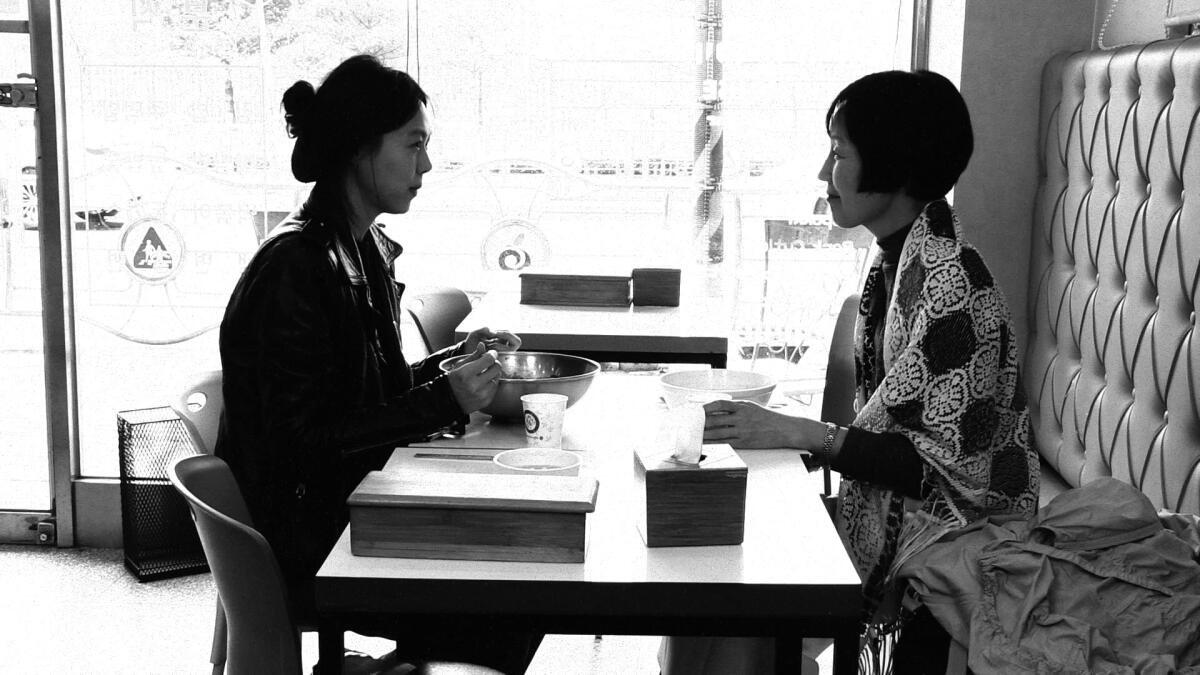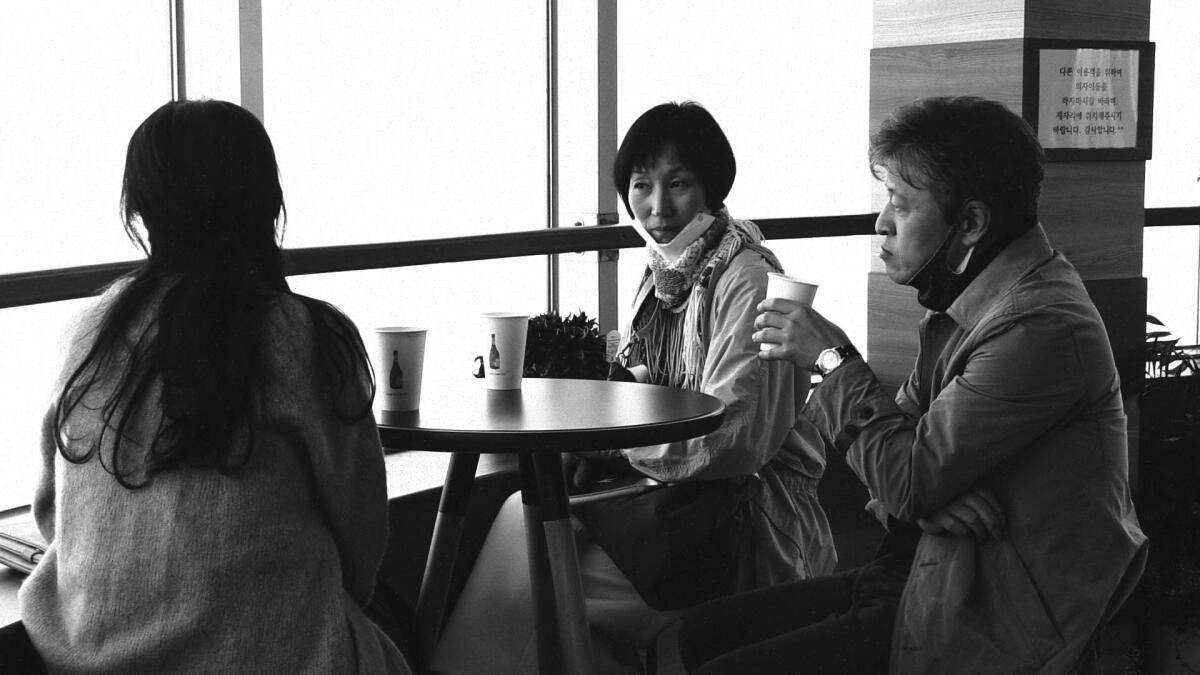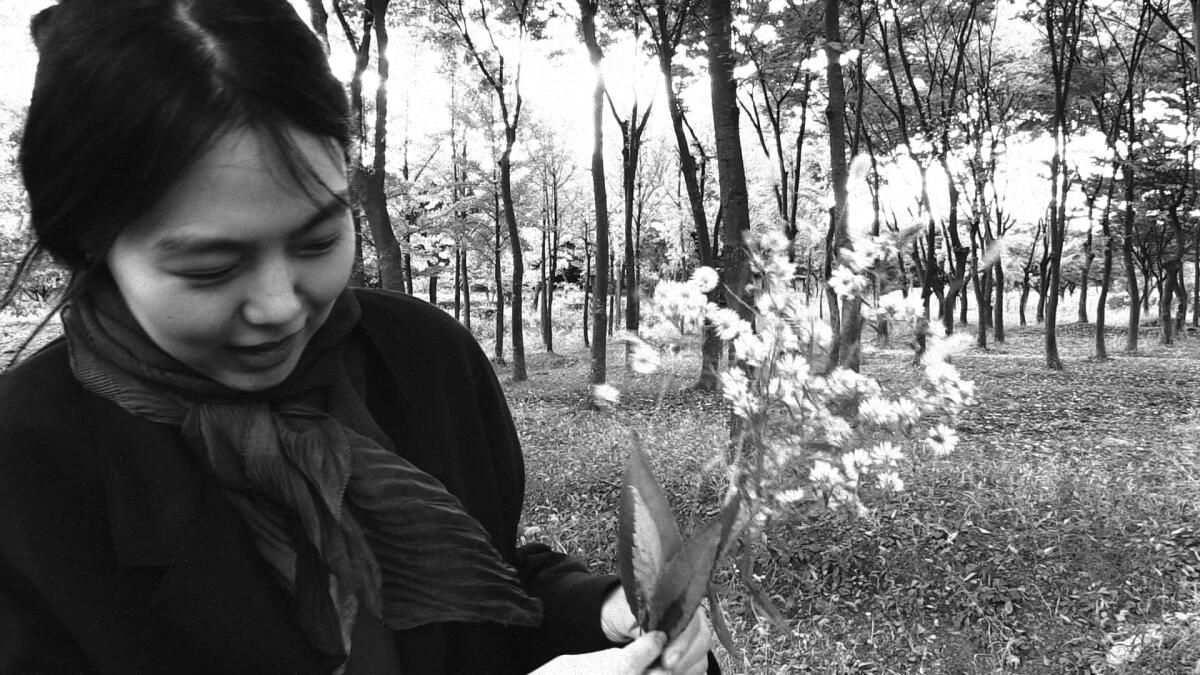Review: ‘The Novelist’s Film’ is another exquisite tale of cinema from Hong Sang-soo

- Share via
Shortly before settling into “The Novelist’s Film,” a tense, absorbing and finally enchanting new movie written and directed by Hong Sang-soo, I couldn’t help but cycle through a flurry of familiar questions: Will this one be in color or black-and-white? Will the protagonist be a writer, a painter, a filmmaker or an actor? Will the story (or stories) unfold in strictly linear fashion, abruptly hit the reset button halfway through or play other gently mind-bending games with time? And most importantly, what will everyone drink: soju, as usual, or something a bit less conducive to Hong’s brand of reckless, well-liquored truth telling?
To answer those questions in no particular order: They stick to coffee until late in the game, when they consume bottle after bottle of sweet, milky makgeolli. The story flows in chronological order, which doesn’t make it any less strange or mysterious, in its way, than it would’ve been with a few of the director’s signature temporal twists. The movie was shot in sharp, high-contrast black-and-white, in the stationary long takes and medium group shots best suited to the characters’ long, leisurely conversations. (Hong, as usual, served as his own cinematographer, editor and composer.) And the protagonist, per the title, is a novelist, albeit one with a severe enough case of writer’s block to consider trying something new.
For your safety
The Times is committed to reviewing theatrical film releases during the COVID-19 pandemic. Because moviegoing carries risks during this time, we remind readers to follow health and safety guidelines as outlined by the CDC and local health officials.
Trying something new, of course, is something that Hong’s detractors likely wish he would do more often — or perhaps not so often, given his unceasing productivity and unflappable consistency. (“The Novelist’s Film,” which won second prize at this year’s Berlin International Film Festival, is the director’s 27th feature and his third picture to be released in U.S. theaters this year, after “Introduction” and “In Front of Your Face.”) But those who love and admire Hong’s work know that the pleasure of it lies precisely in that consistency. With the subtlest of variations and the most quotidian of details, he and his actors unlock piercing insights and rivers of feeling.

One of the chief pleasures of “The Novelist’s Film” is the chance to witness Hong’s continuing collaboration with the veteran actor Lee Hye-young, who, after several years’ absence from the screen, made a comeback of sorts in “In Front of Your Face.” Here she plays the novelist, Jun-hee, who in the opening moments arrives at a bookstore, located some distance outside Seoul, that’s run by an old, unnamed friend (Seo Young-hwa) who used to be part of her tight-knit literary circle. The two haven’t seen each other since, and in their tense but not unfriendly conversation, you sense that Jun-hee isn’t just trying to rekindle an old bond. She’s curious about what it would mean to give up the writer’s life, something she’s contemplating doing herself.
Jun-hee bids adieu to the friend and her kind younger assistant (Park Mi-so) and then — because a Hong movie can never have too many awkward reunions — promptly runs into another old acquaintance, Hyo-jin (Kwon Hae-hyo), and his wife (Lee Eun-mi). More coffee ensues, and more openly barbed conversation, too: It gradually develops that Hyo-jin, a successful director, was once set to adapt one of Jun-hee’s novels — a project that fell apart under circumstances for which she clearly assigns him some of the blame. “You’re ambitious. Extremely so, I’d say,” Jun-hee says, punctuating her every sentence with a casually lacerating laugh. (Lee’s gift for sublimating and venting her character’s rage is but one element of her remarkable performance.)
You might be inclined to think of Hyo-jin as a stand-in for his creator (he wouldn’t be the first). But the greedy, budget-hungry filmmaker that Jun-hee holds in such barely disguised contempt doesn’t sound much like Hong, and as the scenery shifts to a lovely outdoor walking path, the director throws in a curveball — and a third unexpected reunion — with the introduction of Kil-soo (Kim Min-hee, Hong’s most frequent collaborator), an actor whom Hyo-jin recognizes. Kil-soo clearly stirs something in Jun-hee, who regards this smiling, leather-jacketed beauty with a mix of warmth, protectiveness and a faintly acquisitive desire.

Would Kil-soo perhaps consider acting in the short film that Jun-hee, frustrated by her aborted project with Hyo-jin, has been interested in writing? The answer to that question is a tantalizing maybe; Kil-soo is both intrigued and wary. And what kind of a film is Jun-hee trying to make? What she describes sounds a bit like, well, a Hong Sang-soo movie. It’ll have a scripted story of sorts but not be rigidly beholden to it, and it will draw much of its inspiration from the actors and locations. Does this make Jun-hee the movie’s real stand-in for Hong? It’s doubtful. She might avail herself of some of the director’s methods, but her every word brands her as very much her own independent thinker and artist.
So does the short film she ends up making, of which we eventually do see a brief, beguiling snippet. The structuring theme of “The Novelist’s Film” may be artistic frustration, the kind that can spur a writer to call it quits, an actor to take a break and even an established director to reconsider his calling. But it’s also very much about finding creative renewal in unexpected places — a bookstore, an outdoor trail, a movie theater — and learning to embrace, rather than resist, life’s beautifully meandering flow. In one of the movie’s best, most bracing scenes, Jun-hee declares, “Everyone wants to realize their life in their own way.” Their art, too, though one of the wonders of Hong’s cinema is that we can scarcely tell the two apart.
‘The Novelist’s Film’
In Korean dialogue with English subtitles
Not rated
Running time: 1 hour, 32 minutes
Playing: Nov. 7-8, 8 p.m., Acropolis Cinema at 2220 Arts + Archives, Los Angeles; Nov. 11 at Lumiere Cinema at the Music Hall, Beverly Hills
More to Read
Only good movies
Get the Indie Focus newsletter, Mark Olsen's weekly guide to the world of cinema.
You may occasionally receive promotional content from the Los Angeles Times.








